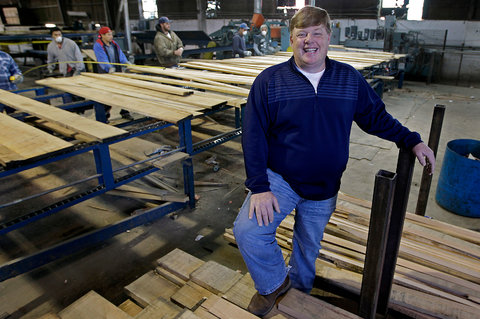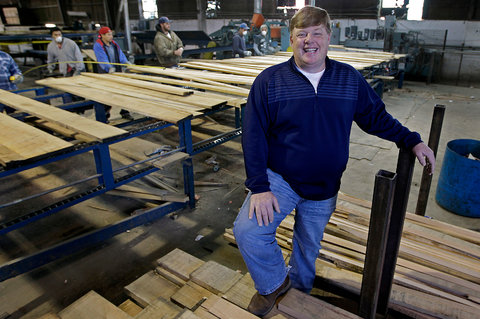 Lance Murphey for The New York Times Bill Courtney: “The great thing about all of this is that anybody can do it.”
Lance Murphey for The New York Times Bill Courtney: “The great thing about all of this is that anybody can do it.”
Building the Team
Hiring, firing, and training in a new era.
A couple of weeks ago, I took to Twitter with the following imperative: “If you haven’t seen the film Undefeated, you should asap. @IamCoachBill is a real #leader who draws out the true #character of his players.”
I tweeted this message after watching “Undefeated,” which won the Academy Award for best documentary feature in 2011. The inspirational film takes place in Memphis and follows Bill Courtney and his Manassas Tigers high school football team through their 2009 season. It is a compelling human interest story — a school based in an impoverished part of Tennessee, where the average median income is less than $10,000, more than 70 percent of the homes don’t have a working car, and only 6 percent of the homes have a college graduate.
It is a great sports story about a football team that in the 10 years leading up to 2003 had accumulated a record of 5 wins and 95 losses and just six years later was casting an eye toward its first playoff appearance. Most important for readers of this blog, it is an extraordinary story of leadership.
Coaching football isn’t Mr. Courtney’s only accomplishment. He is a husband – celebrating his 22nd wedding anniversary this December — a father of four, and a successful entrepreneur. He started his lumber company, Classic American Hardwoods, out of his living room in 2001. Today, it employs 120 people and expects sales of approximately $40 million in 2013.
Mr. Courtney responded to my tweet. We exchanged e-mails and then had the chance to chat by phone. Here’s what I learned about his approach to building and leading a team.
Recruiting
In the film, you were shown recruiting folks at school to join the team. How did you approach recruiting?
I was always recruiting. I would be recruiting all day, every day with a smile and a pat on the back for students as they walked by in the school. If you walk in the hallways, recruiting kids, and they’ve already heard from their peers that you love the heck out of your team and help to get the best out of them, word gets around. All it takes is a sincere reaching out.
I also recruited great coaches to be on my staff. It wasn’t just me. I had nine men on my coaching staff, many of which had played big time college football. All of these guys were volunteers, but they bought into the vision of the football team and the vision for what we could do for the kids.
Practicing
What was your philosophy on practicing and training?
Kids at Manassas worked hard. I approached practice as key to our success and ran it like I run my business: coaches for different positions, organized, on time, and on schedule. The point of practice was to take the natural raw ability that we had recruited onto the team, and then teach them to be good at the fundamentals of the game – both general skills and specific positions.
Motivating
How did you get your team to work so hard?
By working hard. I really believe that. If you’re going to build an organization – a sports team, a business, or any organization, you have to figure out how to get the team members to work hard. At Manassas, the kids knew that I was running my own business, and had a family and my own kids at home, but they saw me working hard every day, volunteering at the school to be their coach. The kids on the team knew that I cared about them and worked hard for them, and as a result, they worked hard for me.
Data-driven decisions versus intuition
In the movie, you are shown watching a lot of game film, using data to inform your strategy. Yet, in one game, you made a spur-of-the-moment decision to put a different player, Chavis, in on defense. He was clearly a talented athlete, but he had never played the position before. How do you balance between data-driven decisions and intuition?
We do that every day in business. We’ve got systems, policies and procedures in place to make decisions based on information that we have gathered, but sometimes you have to make decisions that aren’t in the playbook. You go in with one plan, but you better have backup plans and instinct. The truth is, you’re not risking much when you make a decision with instinct, because what was currently happening wasn’t working. It also comes down to knowing the talent on your team. Players win games, not coaches. I knew Chavis, and I knew he would do what I asked him to do, and that he would win the game for us. Talent would prevail.
Doing something meaningful
One of the most moving parts of the film was when you arranged a sponsor for Money, one of the seniors on the team, so that his entire college bill would be paid. How did you think about doing things that would make such a big impact on the lives of these students?
When I first went to Manassas, long before the cameras were there, I went there to coach football. After a year, it became obvious that there was so much more to do than coach. As time wore on, and as the relationships became deeper, we recognized the opportunity to make a positive impact on kids’ lives.
Mr. Courtney stopped coaching at Manassas so he could spend more time with his family and at his company. He applied the same leadership skills to Classic American Hardwoods that he did to football, and his business has thrived. He had started the company after spending four years at another lumber company, where he rose to become executive vice president of sales. He realized, however, that he needed to start his own business.
Why do you think your company was a success?
Honestly, I tell everybody this, the exact same fundamentals that you use to build a football team are the very same things that enable you to have success in business:
- Act with character and integrity.
- Out-work the competition.
- Understand that sometimes you are going to get knocked down and just get back up.
- It’s not whether or not you make mistakes – you will – it’s how you handle them.
- Surround yourself with like-minded, hard-working people. Experience doesn’t matter. Character and hard work matters.
- Treat people well. Give them the help, tools and training that they need. Then get out of their way and let them grow.
Your business success is even more amazing in the context of raising a family of four and coaching the Manassas team at the same time. How were you able to do it all?
I know I’m repeating myself, but I cannot emphasize enough how important hard work is. In 2003, when the company was only two years old, and I started coaching the Manassas team, my schedule looked like this:
5 a.m.: at the office
2:45 p.m.: leave for practice
3-5:30: practice at Manassas
5:30: leave to attend my kids’ practice
6:30-8:30: kids’ practice
9:00: dinner
11:00: go to bed
Do it all again the next day. There’s no silver bullet. It is hard work. The great thing about all of this is that anybody can do it. To achieve success in America, you don’t need to be a Rhodes scholar or have a Harvard degree, great connections, or tons of money. You just have to be willing to work really, really hard. Isn’t that great?
Bryan Burkhart is a founder of H.Bloom. You can follow him on Twitter.
Article source: http://boss.blogs.nytimes.com/2013/04/30/bill-courtney-offers-leadership-lessons-on-the-field-and-in-business/?partner=rss&emc=rss
